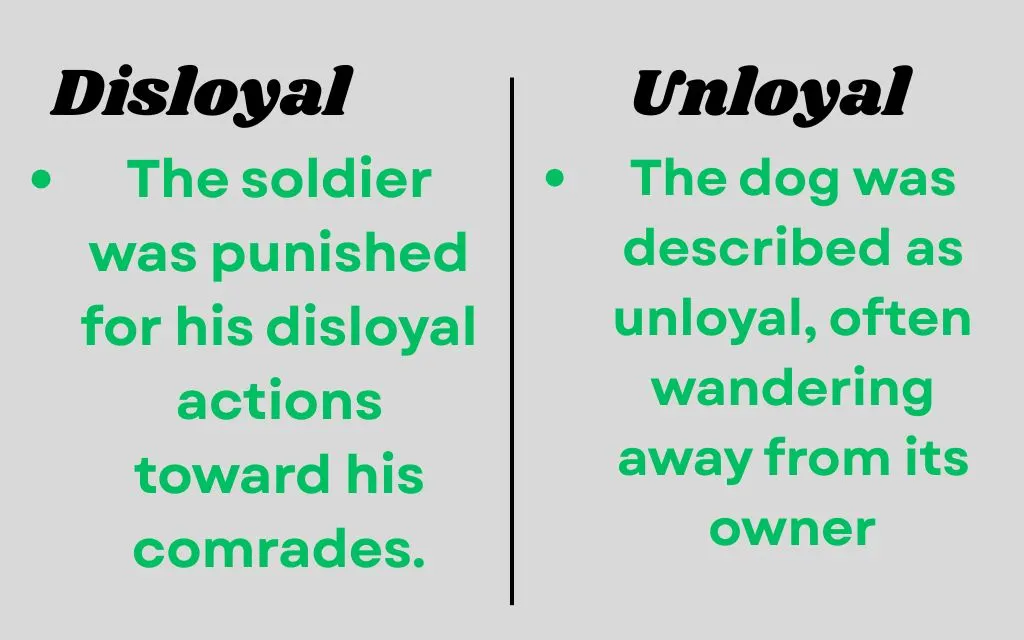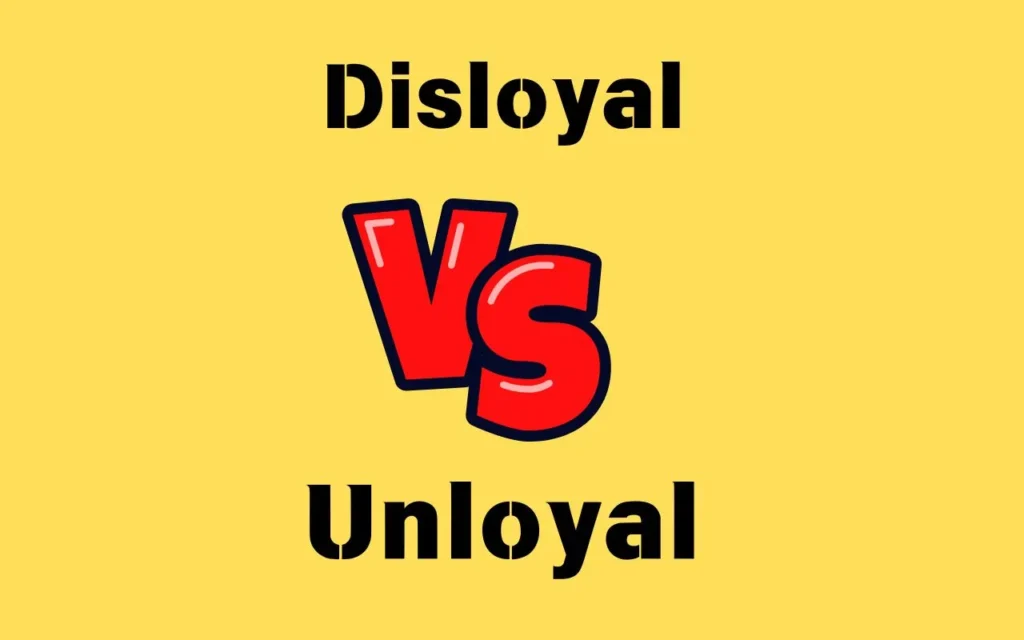Last updated on April 16th, 2025 at 08:11 am
Language is full of subtle nuances, and words like disloyal and unloyal exemplify this complexity. While they may appear to be interchangeable at first glance, their usage and acceptance in English vary widely.
This article dives deep into the distinction between these two words, exploring their meanings, usage, and cultural perceptions.
By the end, you’ll have a thorough understanding of when and why to choose one over the other.
The Meaning Behind the Words “Disloyal” and “Unloyal”

Both disloyal and unloyal share the common theme of a lack of loyalty. However, the differences lie in their formation and historical acceptance.
- Disloyal: The prefix dis- indicates opposition, negation, or reversal, giving disloyal the meaning of actively betraying or being unfaithful.
Example: “The soldier was punished for his disloyal actions toward his comrades.” - Unloyal: The prefix un- simply negates the root word, making unloyal mean not loyal or lacking loyalty without necessarily implying betrayal.
Example: “The dog was described as unloyal, often wandering away from its owner.”
Key takeaway: Disloyal often carries stronger emotional weight, suggesting betrayal, while unloyal feels less intense and is rarely used in modern English.
Is “unloyal” correct, or should you always use “disloyal”? While both words suggest a lack of loyalty, only one is widely accepted in English. Discover the nuanced differences between these terms and learn when to use them effectively. Read more to master this subtle distinction!
Common Usage: Why “Disloyal” Dominates the Conversation
The word disloyal is far more prevalent in both written and spoken English. This dominance can be attributed to several factors:
- Historical Precedence: Disloyal has been a part of the English lexicon for centuries and is firmly entrenched in formal and informal usage.
- Cultural Norms: Society often emphasizes acts of betrayal over passive disloyalty, aligning more naturally with the connotations of disloyal.
- Dictionary Inclusion: Most major dictionaries define and list disloyal, while unloyal is often excluded or marked as less common.
The Role of Language Trends in Word Preference
Language is shaped by the way people communicate, and some words naturally rise to prominence while others fade away. The preference for disloyal over unloyal is an example of this phenomenon.
Factors Driving Word Trends:
- Ease of Use: Words that sound more familiar or natural are more likely to be used. Disloyal follows this pattern, as it aligns with other common dis- words like dishonest or disrespectful.
- Perceived Formality: Unloyal might feel awkward or incomplete to speakers, leading to its avoidance in favor of disloyal.
Insights from Google’s Ngram Viewer
Google’s Ngram Viewer offers a fascinating glimpse into the popularity of words over time.
| Word | Frequency in Literature (1800–2020) |
|---|---|
| Disloyal | Consistently high usage |
| Unloyal | Minimal and declining usage |
What Ngram Data Reveals:
The data shows that disloyal has maintained steady usage across centuries, whereas unloyal has remained marginal, with no significant spikes.
Conclusion from Data: English speakers have consistently preferred disloyal over unloyal, reinforcing the latter’s status as a rare or even non-standard word.
Is “Unloyal” Grammatically Incorrect?
Strictly speaking, unloyal is not grammatically incorrect. However, it is considered less conventional and may be seen as awkward or informal.
Why It’s Rarely Used:
- Lack of Familiarity: Speakers tend to avoid words that don’t feel established in common usage.
- Alternative Options: Words like disloyal and unfaithful serve the same purpose and are more widely understood.
Tip: While unloyal is not “wrong,” using disloyal will likely sound more polished and natural.
The Nuances of Language: When to Use “Disloyal” Over “Unloyal”
Use Disloyal When:
- Describing an act of betrayal.
Example: “The employee’s disloyal behavior shocked the management team.” - Conveying a sense of deliberate unfaithfulness.
Example: “Her disloyalty to the cause was evident in her actions.”
Use Unloyal When:
- Referring to a passive or less intentional lack of loyalty.
Example: “The unloyal dog often followed strangers home.”
However, even in these cases, other alternatives like not loyal or unfaithful may sound better.
Context Matters: Examining Sentence Examples
Examples with Disloyal:
- “The politician’s disloyal comments created a media storm.”
- “He was accused of disloyalty to his country.”
Examples with Unloyal:
- “The unloyal friend didn’t stand by her during tough times.”
- “Unloyal behavior is uncommon in domesticated animals.”
Observation: The examples with disloyal sound more natural and impactful, further highlighting its dominance in English.
Perceptions of Loyalty: Exploring Cultural Influences on Language
Cultural values shape how people perceive and express loyalty, influencing word choice.
Key Cultural Insights:
- Western Norms: In Western cultures, loyalty is often associated with relationships and national identity, making disloyal a critical descriptor for betrayal.
- Eastern Perspectives: In collectivist societies, loyalty to family or community is paramount, and violations are often framed in strong terms like betrayal.
- Media Influence: Movies, books, and news headlines frequently use disloyal, reinforcing its dominance.
Avoiding the Trap of Spellcheckers: Navigating “Unloyal” and “Disloyal”
Spellcheck tools are designed to catch errors, but they might not always flag uncommon words like unloyal.
Common Scenarios:
- Autocorrect: May not recognize unloyal as a legitimate word, suggesting alternatives like disloyal or loyal.
- Grammar Checkers: Tools like Grammarly might highlight unloyal as non-standard or suggest revisions.
Best Practice: Trust your understanding of the context and use disloyal for clearer, more widely accepted communication.
Unloyal in Digital Searches: Understanding Search Engine Behavior
Search engines like Google provide insight into how often people look up terms like unloyal versus disloyal.
Keyword Data:
- Disloyal: High search volume, with people seeking definitions and examples.
- Unloyal: Relatively low search volume, indicating less curiosity or usage.
Implication: Opting for disloyal in your writing increases clarity and aligns better with user expectations.
FAQs
What is the difference between “disloyal” and “unloyal”?
“Disloyal” implies betrayal or active unfaithfulness, while “unloyal” simply means lacking loyalty and is considered less conventional in modern usage.
Is “unloyal” a real word in English?
Yes, “unloyal” is a real word and not grammatically incorrect. However, it is rarely used and considered less formal or natural than “disloyal.”
Why is “disloyal” more common than “unloyal”?
“Disloyal” has historical precedence, stronger emotional weight, and wider acceptance in dictionaries, making it the preferred choice in English.
Can I use “unloyal” in professional writing?
It’s best to avoid “unloyal” in professional writing as it may seem awkward or informal. Opt for “disloyal” or “not loyal” instead.
What are some examples of sentences with “disloyal”?
Examples include: “The spy was disloyal to his country,” or “Her disloyalty to the team was shocking.”
Is “disloyal” a stronger word than “unloyal”?
Yes, “disloyal” carries a stronger connotation of betrayal, while “unloyal” feels passive and less emotionally charged.
Conclusion
The debate between disloyal and unloyal is less about correctness and more about preference and clarity. While unloyal isn’t technically wrong, disloyal has long been the favored choice in English, thanks to its historical roots and stronger emotional impact.
If you want your writing to resonate and feel natural, stick with disloyal. It’s a word that carries weight, conveys intent, and aligns with both cultural and linguistic norms. By understanding the nuances outlined in this guide, you’ll always choose the right word with confidence.





